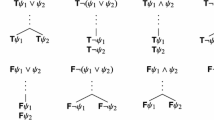Abstract
Eliminating previously recommended items in a critiquing dialogue prevents the user from navigating back to acceptable items she critiqued earlier in the dialogue. An equally serious problem if previous recommendations are not eliminated is that acceptable items may be unreachable by any sequence of critiques. Progressive critiquing solves this dilemma while also making it easier for users to recognize when none of the available items are acceptable. In this paper, we present theoretical and empirical results that demonstrate the benefits of a critiquing strategy in which the user gives priority to constraints that must be satisfied in a progressive critiquing dialogue. We also present a new version of progressive critiquing in which mixed-initiative relaxation of constraints introduced by user critiquing choices that depart from this strategy greatly reduces their impact on dialogue outcomes.
Preview
Unable to display preview. Download preview PDF.
Similar content being viewed by others
References
Burke, R., Hammond, K.J., Young, B.: The FindMe Approach to Assisted Browsing. IEEE Expert 12, 32–40 (1997)
Hammond, K.J., Burke, R., Schmitt, K.: A Case-Based Approach to Knowledge Navigation. In: Leake, D.B. (ed.) Case-Based Reasoning: Experiences, Lessons & Future Directions. AAAI Press/MIT Press, Menlo Park, CA, pp. 125–136 (1996)
Linden, G., Hanks, S., Lesh, N.: Interactive Assessment of User Preference Models: The Automated Travel Assistant. In: Proceedings of the 6th International Conference on User Modeling, pp. 67–78 (1997)
McCarthy, K., Reilly, J., McGinty, L., Smyth, B.: Experiments in Dynamic Critiquing. In: Proceedings of the International Conference on Intelligent User Interfaces, pp. 175–182 (2005)
McSherry, D., Aha, D.W.: Avoiding Long and Fruitless Dialogues in Critiquing. In: Bramer, M., Coenen, F., Tuson, A. (eds.) Research and Development in Intelligent Systems XXIII. BCS Conference Series, pp. 173–186. Springer, London (2006)
McSherry, D., Aha, D.W.: The Ins and Outs of Critiquing. In: Veloso, M. (ed.) Proceedings of the 20th International Joint Conference on Artificial Intelligence, pp. 962–967 (2007)
Reilly, J., McCarthy, K., McGinty, L., Smyth, B.: Incremental Critiquing. Knowledge-Based Systems 18, 143–151 (2005)
McSherry, D.: Similarity and Compromise. In: Ashley, K.D., Bridge, D.G. (eds.) ICCBR 2003. LNCS (LNAI), vol. 2689, pp. 291–305. Springer, Heidelberg (2003)
Thompson, C.A., Göker, M.H., Langley, P.: A Personalized System for Conversational Recommendations. Journal of Artificial Intelligence Research 21, 393–428 (2004)
Ricci, F., Arslan, B., Mirzadeh, N., Venturini, A.: ITR: A Case-Based Travel Advisory System. In: Craw, S., Preece, A.D. (eds.) ECCBR 2002. LNCS (LNAI), vol. 2416, pp. 613–627. Springer, Heidelberg (2002)
McSherry, D.: Incremental Relaxation of Unsuccessful Queries. In: Funk, P., González Calero, P.A. (eds.) ECCBR 2004. LNCS (LNAI), vol. 3155, pp. 331–345. Springer, Heidelberg (2004)
McGinty, L., Smyth, B.: Comparison-Based Recommendation. In: Craw, S., Preece, A.D. (eds.) ECCBR 2002. LNCS (LNAI), vol. 2416, pp. 575–589. Springer, Heidelberg (2002)
Aha, D.W., Breslow, L.A., Muñoz-Avila, H.: Conversational Case-Based Reasoning. Applied Intelligence 14, 9–32 (2001)
Aha, D.W., McSherry, D., Yang, Q.: Advances in Conversational Case-Based Reasoning. Knowledge Engineering Review 20, 247–254 (2005)
Author information
Authors and Affiliations
Editor information
Rights and permissions
Copyright information
© 2007 Springer-Verlag Berlin Heidelberg
About this paper
Cite this paper
McSherry, D., Aha, D.W. (2007). Mixed-Initiative Relaxation of Constraints in Critiquing Dialogues. In: Weber, R.O., Richter, M.M. (eds) Case-Based Reasoning Research and Development. ICCBR 2007. Lecture Notes in Computer Science(), vol 4626. Springer, Berlin, Heidelberg. https://doi.org/10.1007/978-3-540-74141-1_8
Download citation
DOI: https://doi.org/10.1007/978-3-540-74141-1_8
Publisher Name: Springer, Berlin, Heidelberg
Print ISBN: 978-3-540-74138-1
Online ISBN: 978-3-540-74141-1
eBook Packages: Computer ScienceComputer Science (R0)




